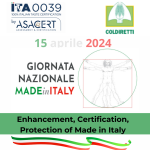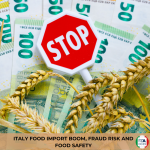White red and green seem to be the colors of purchases preferred by Italians: 82% (Coldiretti / Ixè data) have developed a particular tendency to look for Italian products on the shelves. A conscious trend that helps economics and territoriality.
The retail trade shows a foreseeable 10% drop compared to May of last year, but a 24.3% increase compared to the month of April.
In the wake of this trend, the issue of transparency, labeling and the protection of the real Made in Italy can only find greater impetus.

Fabrizio Capaccioli
ASACERT Managing Director
The comment of Fabrizio Capaccioli creator of ITA0039:
“Italy must take on the responsibility of being a guide in Europe, to encourage production issues in line with sustainability criteria, so that productions are guaranteed in balance with natural cycles, also by taking advantage of the opportunities offered by the historic opening of the EU about the obligation of origin with the indication of the Country, thanks to the new Farm to Fork Strategy, in the broader context of the Green New Deal, which proposes ambitious measures to ensure that the healthiest option is at the same time the easiest option for citizens. It is a matter of speaking clearly and of acting limpidly, it is no longer the time to pursue profit as an end in itself, we must be strategically forward-looking, really think about the future, which cannot exist without a deep attention to the sustainability and healthiness of the productions. We, we do our part, move our action in favor of the protection of healthy Italian agri-food products in the world with our ITA0039 certification protocol, which is becoming a reference point and, at the same time, the target of many Italian food entrepreneurs abroad.“
Thanks to a clearer labeling it is possible to respond more adequately to the information needs regarding healthy and sustainable food, without forgetting the indication of origin, of which we can be proud. The italian agri-food industry can, in fact, boast a long series of records: it is the “greenest” in Europe with 303 geographical indications recognized at Community level and 415 wines with Quality Assurance Label; 5155 traditional regional products surveyed along the Peninsula and a leadership in the organic sector given by over 60,000 organic farms. Without forgetting the primacy of world food safety thanks to the lower number of agri-food products with irregular chemical residues.
According to the Nomisma Report “The economic and productive role of the Italian agri-food industry in time of Covid-19 and long-term scenarios”, the agri-food industry is increasingly green and digital and it seems that the difficulties of the last few months have left, at least in the approach to the consumption of citizens, an increased awareness in terms of attention to Made in Italy (26%), environmental protection (22%), the typical features of the territory (16%), health (15%).
Even the local shops have been positively affected by this trend of healthy eating, which does not necessarily mean eating expensive, but rediscovering the health value of food as an indispensable value.
The Italian agri-food sector is, therefore, a champion of resilience, is what emerges from the report of the second quarter by Coface, in which the large-scale retail trade recorded increases in sales of up to 10% compared to last year. In general, however, the food, medical, sanitation and hygiene sectors suffered much less than others.
The Italians taught the world to eat by sitting at the table. However, over the years anyone who has gone abroad and wanted to try an Italian restaurant, out of curiosity or nostalgia, often found himself in front of disappointing folkloristic representations and light years away from our kitchen, if we talk about the products, we come across the true Achilles heel of our trade balance in the agri-food sector. This is one of the motivational levers of ITA0039, the certification tool of recognition and authenticity, an articulated and reliable network, dedicated to the enhancement and diffusion of the Italian food and wine product in the world.






